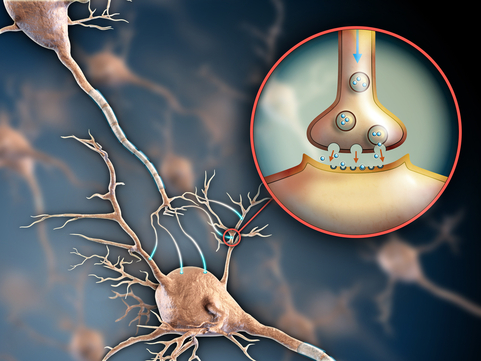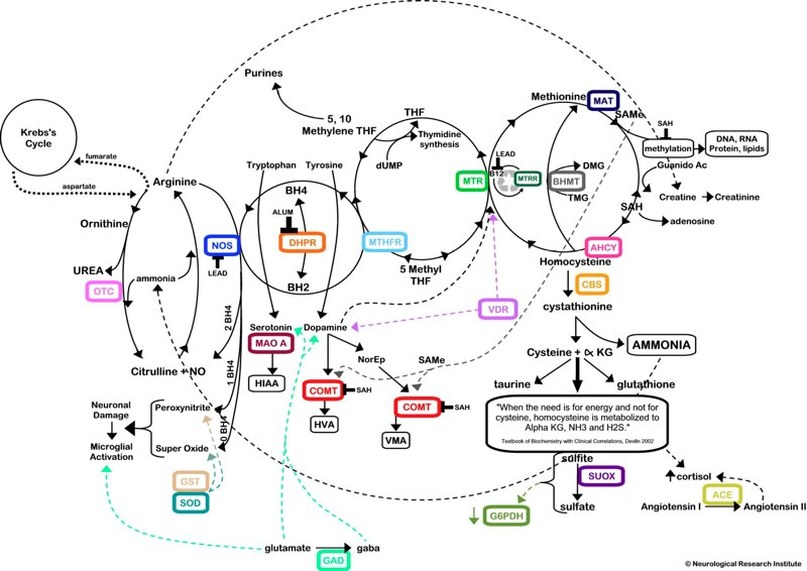Methylation and Your Mood
Disclaimer: This information is presented for descriptive purposes only. It is in no way intended for diagnosis or treatment. It comes from my own research and reading on the subject. Individuals should always do their own research and seek advice from an appropriately trained professional. Find a Bio-Balance trained doctor.
Here is a very short summary of a very complicated process:
- Methylation is a chemical process in the body that indirectly affects the balance of neurotransmitters (the chemicals that transmit signals) in your brain.
- Neurotransmitters affect how you feel.
- In most people methylation works well, but in a small number of people it can be over- or under-active.
- Undermethylators have a deficiency of active neurotransmitters affecting their mood.
- Overmethylator symptoms are due to an excess of neurotransmitters causing overstimulation.
- Neurotransmitters affect how you feel.
- In most people methylation works well, but in a small number of people it can be over- or under-active.
- Undermethylators have a deficiency of active neurotransmitters affecting their mood.
- Overmethylator symptoms are due to an excess of neurotransmitters causing overstimulation.
|
Behind the scenes in our brain
Our thoughts, feelings and reactions are all the result of a mass of brain cells (neurons) communicating information. Brain cells don’t touch: they transmit information chemically and electrically. |
Here is a more detailed but still very simplified explanation of how Methylation can affect our mental and emotional states.
Signalling Cells
For information to be transmitted between two cells a little squirt of neurotransmitter (chemical messenger) leaves the end of one cell, and, if everything goes well, floats over the gap and locks into receptors on the neighbouring cell to create the signal. Once the signal (actually an electrical impulse) is sent, the neurotransmitter material is taken back into its original cell. There are several different types of neurotransmitters that perform different functions and create many different moods. |
The three main neurotransmitters that affect mood are also affected by methylation.
- Serotonin - responsible for our sense of wellbeing
- Dopamine - helps us experience reward and motivation
- Noradrenaline - famous for fight-or-flight; we also need this to be alert
- Serotonin - responsible for our sense of wellbeing
- Dopamine - helps us experience reward and motivation
- Noradrenaline - famous for fight-or-flight; we also need this to be alert
Mind the gap
Simply put, in order for signal transmission to run smoothly we need:
- Enough of a particular neurotransmitter coming from the sending cell.
- Enough of that neurotransmitter left in the gap between the neurons for the right amount of time.
- Enough receptors on the receiving cell to collect the neurotransmitter.
When it comes to methylation, what happens in the gap is important.
Simply put, in order for signal transmission to run smoothly we need:
- Enough of a particular neurotransmitter coming from the sending cell.
- Enough of that neurotransmitter left in the gap between the neurons for the right amount of time.
- Enough receptors on the receiving cell to collect the neurotransmitter.
When it comes to methylation, what happens in the gap is important.
|
Neurotransmitter transporters
Neurotransmitters left in the gap need to be cleaned up and transported back into the cell by substances called ‘reuptake transporters’. When these transporters are too enthusiastic, or too slow and sloppy, we feel the effect of too much or too little of that neurotransmitter. Even if we have plenty of a particular neurotransmitter, if it’s cleaned up before it does its job, it’s the same as not having enough. Think of this as like an over-enthusiastic host clearing the table when you are part way through your meal. There’s plenty of food but not enough gets in your belly! |
How anti-depressants work: |
About Methylation
Methlylation is the process of adding or donating methyl groups from one chemical, molecule or protein to another. It is a long and detailed chain of chemical events that is happening over and over inside you as you read this article, so this is a very simplified explanation. The methylation pathway is usually represented by a series of cogs and wheels creating interconnected cycles. Each wheel uses different enzymes and nutrients, and each cog depends on the wheel before it to operate effectively. Amongst many, many other things the methylation cycle governs gene expression.
The Methylation Cycle - This is a seriously complicated process happening every second in your body
A Little Snippet about SNPs
Single Nucleotide polymorphism’s (SNPs) are little genetic abnormalities. They are very common and most don’t cause much, if any, trouble at all. In fact, most of us have up to 1000 SNPs (little genetic mutations) and we get along just fine. However, if the SNPs are in the methyl cycle, then depending on how many and in which area of the cycle, we can make too much or too little methyl. Either of these can cause problems at the pointy end of us – our brain.
Single Nucleotide polymorphism’s (SNPs) are little genetic abnormalities. They are very common and most don’t cause much, if any, trouble at all. In fact, most of us have up to 1000 SNPs (little genetic mutations) and we get along just fine. However, if the SNPs are in the methyl cycle, then depending on how many and in which area of the cycle, we can make too much or too little methyl. Either of these can cause problems at the pointy end of us – our brain.
|
Undermethylation
If you are an 'undermethylator’ the genes that make your transporter proteins are not being switched off. You probably have several SNPs at important points in the cycle, so it tips toward not working up to speed. If too many genes are turned on (because they are not being turned off) neurotransmitter transporter production is increased; this means less of the neurotransmitter is available at the gap. We need the neurotransmitter to hang around long enough to get the ‘message across’, just like we need the food left on the table long enough for us to eat our fill. At the neuronal level you are overproducing reuptake material, and your key happy neurotransmitter, serotonin, is being swept away before it can do one of its jobs, helping you feel okay. This explains, for example, why a person who is under-methylating is (sometimes but not always) prone to anxiety and/or depression. Serotonin creates our sense of well-being and peace in the world. |
Overmethylation
Overmethylation is a case of having too many methyl groups. So when the SNP (the genetic abnormality) relates to a nutrient deficiency (folate), this results in a lack of genes being turned on to make re-uptake transporters. The end product is an oversupply of serotonin, dopamine and noradrenaline. Overmethylation is the opposite of undermethylation. When you overmethylate you end up with less neurotransmitter reuptake transporters and therefore more neurotransmitters hanging around overstimulating the cells and not getting recycled correctly. In this situation it is like we have a host that is forcing us to eat way beyond our limit. Excess serotonin does not make one happier--it hypes you up (see Serotonin Syndrome research). However, the issues overmethylators experience are more likely related to excess noradrenaline (norepinephrine), often to the point of suffering a constant feeling of anxiety or unease. |
Because the undermethylator's issue is too much transporter material, they usually respond well to antidepressants (SSRIs). SSRI medication counteracts the increase in transporters by blocking reuptake of serotonin.
Methylation works well for most
Don’t be alarmed. Most people (around 70%) have no significant problem in their methylation cycles.
However, about 8% of the population over-methylate, and about 22% under-methylate.
The hit-home message here is that of the 30% of people who have methylation issues, 70% will experience some form of psychological problem as a result. This works out to be around 21% overall for whom methylation issues could be messing with their mental well-being.
Symptoms of Methylation Issues
These symptoms are not diagnostic, and there is often an overlap between types. I have met highly motivated and inwardly competitive overmethylators, and undermethylators with dry mouths and no hint of allergy. These are lists where one might only tick a few boxes yet still have methylation issues, or may tick several boxes only to discover their methylation is just fine.
Undermethylation
High achiever/high motivation
Family history of high achievement
Self-motivated (can push self at school or university)
Competitive, if only internally (or externally in sport)
Strong-willed (can tend toward problems with authority figures or 'control freak" behaviour)
Tends to be non-compliant (especially, and unfortunately, with treatment!)
ADHD/Oppositional Defiant Disorder
Difficulty with transitions
High energy/high libido
Addictive tendencies/OCD tendencies
Calm demeanour but high inner tension
Low pain tolerance
Doesn’t like the heat
Seasonal/inhalant allergies
Can hear pulse in head on the pillow at night
Ruminations regarding past
Good response to SSRIs (anti-depressants) or SAMe
Tears up easily and has plenty of saliva
SAD - Seasonal Affective Disorder (feels worse in winter)
Many high achievers are undermethylators, and with high inner motivation they can reach great heights. Their ability to attend to details, organise themselves and others and be goal-oriented can lead to a significant level of accomplishment. However, if afflicted by an underlying depression or anxiety, their drive can manifest in never feeling satisfied with (or even completing) their last project and always moving on toward the next goal.
The extreme negative manifestation can lead to the development of controlling behaviour, obsessive/compulsive traits and addictions.
Children can be A students or divert their strong will into oppositional-defiant type behaviour, rebelling against authority. Teens may channel their drive toward computer gaming, drugs and alcohol, eating or dating.
High achiever/high motivation
Family history of high achievement
Self-motivated (can push self at school or university)
Competitive, if only internally (or externally in sport)
Strong-willed (can tend toward problems with authority figures or 'control freak" behaviour)
Tends to be non-compliant (especially, and unfortunately, with treatment!)
ADHD/Oppositional Defiant Disorder
Difficulty with transitions
High energy/high libido
Addictive tendencies/OCD tendencies
Calm demeanour but high inner tension
Low pain tolerance
Doesn’t like the heat
Seasonal/inhalant allergies
Can hear pulse in head on the pillow at night
Ruminations regarding past
Good response to SSRIs (anti-depressants) or SAMe
Tears up easily and has plenty of saliva
SAD - Seasonal Affective Disorder (feels worse in winter)
Many high achievers are undermethylators, and with high inner motivation they can reach great heights. Their ability to attend to details, organise themselves and others and be goal-oriented can lead to a significant level of accomplishment. However, if afflicted by an underlying depression or anxiety, their drive can manifest in never feeling satisfied with (or even completing) their last project and always moving on toward the next goal.
The extreme negative manifestation can lead to the development of controlling behaviour, obsessive/compulsive traits and addictions.
Children can be A students or divert their strong will into oppositional-defiant type behaviour, rebelling against authority. Teens may channel their drive toward computer gaming, drugs and alcohol, eating or dating.
Overmethylation
Low achiever/non competitive (but may do well in school because it's "what you do" = try your best to please others)
Low motivation (regardless of intelligence)
Creative (e.g. artistic or musical ability)
Often kind and 'selfless' in actions
Nervousness, high anxiety, tendency to panic
Nervous legs/pacing
Can be hyperactive/ADHD
Low libido
Difficulty sleeping soundly
High pain threshold (check your head bangers)
Tendency to food or chemical sensitivity
But little or no seasonal allergies
Eczema/dry skin
Dry eyes and mouth
Depression
Self-isolation, may prefer own company
Tinnitis
Upper body pain (stiff muscles)
Adverse response to SSRIs
The overmethylator is motivated by the opposite characteristics of an undermethylator due to opposite levels of histamine. Where the undermethylator can be driven to success, the overmethylator is not motivated by being better than others; their compassionate and kind nature allows them to easily put others' needs ahead of their own. They may succeed as great musicians or designers or fit comfortably into service roles in nursing or health care.
However, given their sensitivity and other-orientedness they may also be hurt more deeply by the insults of life, dwelling on things and perpetuating their inner tension or anxiety. They grapple to understand the injustice of others and tend to blame themselves for any unkind actions of others toward them.
Children may display their high inner tension in hyperactivity or become overwhelmed by anxiety.
Teens may struggle with low motivation, depression and sensitivity to unfairness and perceived rejection.
Low achiever/non competitive (but may do well in school because it's "what you do" = try your best to please others)
Low motivation (regardless of intelligence)
Creative (e.g. artistic or musical ability)
Often kind and 'selfless' in actions
Nervousness, high anxiety, tendency to panic
Nervous legs/pacing
Can be hyperactive/ADHD
Low libido
Difficulty sleeping soundly
High pain threshold (check your head bangers)
Tendency to food or chemical sensitivity
But little or no seasonal allergies
Eczema/dry skin
Dry eyes and mouth
Depression
Self-isolation, may prefer own company
Tinnitis
Upper body pain (stiff muscles)
Adverse response to SSRIs
The overmethylator is motivated by the opposite characteristics of an undermethylator due to opposite levels of histamine. Where the undermethylator can be driven to success, the overmethylator is not motivated by being better than others; their compassionate and kind nature allows them to easily put others' needs ahead of their own. They may succeed as great musicians or designers or fit comfortably into service roles in nursing or health care.
However, given their sensitivity and other-orientedness they may also be hurt more deeply by the insults of life, dwelling on things and perpetuating their inner tension or anxiety. They grapple to understand the injustice of others and tend to blame themselves for any unkind actions of others toward them.
Children may display their high inner tension in hyperactivity or become overwhelmed by anxiety.
Teens may struggle with low motivation, depression and sensitivity to unfairness and perceived rejection.
Dr. Bill Walsh describes how anti-depressant medication can cause havoc with an overmethylator. This is due to the doubling-up effect of dampening serotonin reuptake. Overmethylators already have plenty of reuptake transporters, so inhibiting reuptake further with an SSRI creates a double-whammy with potential for a massive overload of neurotransmitters. Dr. Walsh proposes that the very few individuals who have strong adverse effects to SSRIs, even to the point of suicidal acts, are often over-methylators.
Treatment
I won’t go into treatment in too much detail, because you really need to see a specially-trained health practitioner for treatment. However, having come this far, I do feel I need to tell you a few things.
One is that what is good for an undermethylator is NOT good for an overmethylator.
- Undermethylators usually do okay on SSRIs and SAMe (S-Adenosyl methionine) or Methionine, whereas overmethylators will not.
- Overmethylators need more folate (and niacin and B12) to bind the excess methyl groups.
- Undermethylators often find they feel worse on folate or folic acid, but benefit from additional calcium, magnesium, and vitamin B6.
Please see an appropriately trained Health Practitioner to treat any issues that you think you may have. You don’t want to incorrectly mess with the methylation cycle! Find a doctor here.
TESTING - Histamine Hints at Methylation Status
There are other methods that can more accurately measure methylation, but the most commonly used, “quick and dirty”, measure of methylation status is to measure whole-blood histamine levels.
If histamine is within normal range (0.45- 0.5. or 48-60), it can indicate that methylation is working okay. A high histamine level (>0.6 or 70) could mean you are an undermethylator, and a low histamine level (<0.35 or 48) could indicate you are an overmethylator.
*If you are getting a whole-blood histamine test to assess methylation, remember not to take any antihistamine medications for 10 days prior to testing as these will mess up the results.
There are other methods that can more accurately measure methylation, but the most commonly used, “quick and dirty”, measure of methylation status is to measure whole-blood histamine levels.
If histamine is within normal range (0.45- 0.5. or 48-60), it can indicate that methylation is working okay. A high histamine level (>0.6 or 70) could mean you are an undermethylator, and a low histamine level (<0.35 or 48) could indicate you are an overmethylator.
*If you are getting a whole-blood histamine test to assess methylation, remember not to take any antihistamine medications for 10 days prior to testing as these will mess up the results.
Last words
As you may have gleaned, there is always a balancing act going on between all the various aspects of physiological functioning. The effects of too much or too little methylation on neurotransmitter levels may not show up for a long time, if at all. OR, depending on what else is going on in the person’s life, body, genetics, etc., the effects of faulty methylation may manifest in a mood disorder or significant mental illness. As always, the effect of life events, personal history, stress and personality cannot be separated from one's current mental state.
References
William J. Walsh, Nutrient Power
Dr. Menash, presentation, http://www.mensahmedical.com/resourcecenter.html
Dr. A.T. Lewis, http://www.integrativepediatricsofohio.com
Want to know more about SNP's and methylation?
http://mthfr.net
http://epigenie.com/snps-nutrition-and-dna-methylation-with-dr-steven-zeisel/
As you may have gleaned, there is always a balancing act going on between all the various aspects of physiological functioning. The effects of too much or too little methylation on neurotransmitter levels may not show up for a long time, if at all. OR, depending on what else is going on in the person’s life, body, genetics, etc., the effects of faulty methylation may manifest in a mood disorder or significant mental illness. As always, the effect of life events, personal history, stress and personality cannot be separated from one's current mental state.
References
William J. Walsh, Nutrient Power
Dr. Menash, presentation, http://www.mensahmedical.com/resourcecenter.html
Dr. A.T. Lewis, http://www.integrativepediatricsofohio.com
Want to know more about SNP's and methylation?
http://mthfr.net
http://epigenie.com/snps-nutrition-and-dna-methylation-with-dr-steven-zeisel/







